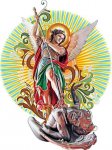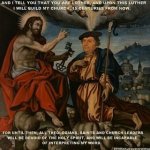OFFICE OF POPE IN THE BIBLE
Isa. 22: 19 I will thrust you from your office, and you will be pulled down from your station.
Shebna is described as having an "office" and a "station." An office, in order for it to be an office, has successors. In order for an earthly kingdom to last, a succession of representatives is required.
This was the case in the Old Covenant kingdom, and it is the case in the New Covenant kingdom which fulfills the Old Covenant
. Jesus our King is in heaven, but He has appointed a chief steward over His household with a plan for a succession of representatives.
Isa.22:20 In that day I will call my servant Eli'akim the son of Hilki'ah,
Isa. 22:20 - in the old Davidic kingdom, Eliakim succeeds Shebna as the chief steward of the household of God. The kingdom employs a mechanism of dynastic succession. King David was dead for centuries,
but his kingdom is preserved through a succession of representatives.
Isa.22:21 and I will clothe him with your robe, and will bind your girdle on him, and will commit your authority to his hand; and he shall be a father to the inhabitants of Jerusalem and to the house of Judah.
Isa. 22:21 - Eliakim is called “father” or “papa” of God's people. The word Pope used by Catholics to describe the chief steward of the earthly kingdom
simply means papa or father in Italian. This is why Catholics call the leader of the Church "Pope." The Pope is the father of God's people, the chief steward of the earthly kingdom and Christ's representative on earth.
Isa.22:22 And I will place on his shoulder the key of the house of David; he shall open, and none shall shut; and he shall shut, and none shall open.
Isa. 22:22 - we see that the keys of the kingdom pass from Shebna to Eliakim.
Thus, the keys are used not only as a symbol of authority, but also to facilitate succession. The keys of Christ's kingdom have passed from Peter to Linus all the way to our current Pope with an unbroken lineage for almost 2,000 years.
23: And I will fasten him like a peg in a sure place, and he will become a throne of honor to his father's house.
Rev. 1:18; 3:7; 9:1; 20:1 - Jesus' "keys" undeniably represent authority. By using the word "keys," Jesus gives Peter authority on earth over the new Davidic kingdom, and this was not seriously questioned by anyone until the Protestant reformation 1,500 years later after Peter’s investiture.
Revelation 3:7 "And to the angel of the church in Philadelphia write: `The words of the holy one, the true one, who has the
key of David,
who opens and no one shall shut, who shuts and no one opens.
Matthew 16:19 I will give you the keys of the kingdom of heaven, and whatever you bind on earth shall be bound in heaven, and whatever you loose on earth shall be loosed in heaven."
Matt. 16:19 - whatever Peter binds or looses on earth is bound or loosed in heaven / when the Prime Minister to the King opens, no one shuts. This "binding and loosing" authority
allows the keeper of the keys to establish "halakah," or rules of conduct for the members of the kingdom he serves.
Jer. 33:17 For thus saith the Lord: There shall not be cut off from David a man to sit upon the throne of the house of Israel.
Jeremiah prophesies that David shall never lack a man to sit on the throne of the earthly House of Israel.
Either this is a false prophecy, or David has a successor of representatives throughout history.
Dan. 2:44 But in the days of those kingdoms the God of heaven will set up a kingdom that shall never be destroyed, and his kingdom shall not be delivered up to another people, and it shall break in pieces, and shall consume all these kingdoms, and itself shall stand for ever.
Daniel prophesies an earthly kingdom that will never be destroyed. Either this is a false prophecy, or the earthly kingdom requires succession.





